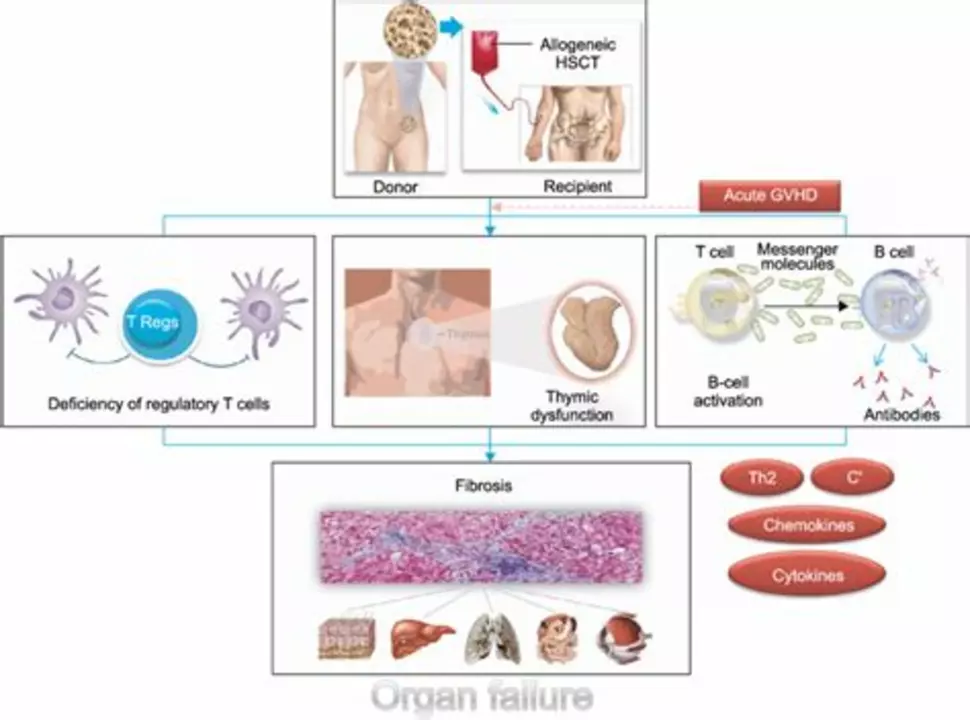Understanding Graft-Versus-Host Disease
Graft-versus-host disease (GVHD) is a serious and potentially life-threatening complication that can occur after certain types of stem cell or bone marrow transplants. In GVHD, the transplanted cells, known as the "graft," attack the recipient's healthy cells, viewing them as foreign invaders. This can lead to a wide range of symptoms, from mild skin rashes to severe organ damage.
As a patient or caregiver, it's essential to understand the basics of GVHD, its causes, symptoms, and treatment options. In this section, we will dive into the complexities of GVHD and explore how ibrutinib, a promising new medication, can help in the fight against this challenging condition.
Ibrutinib: A Novel Approach to Treating GVHD
Ibrutinib is a targeted therapy that has been shown to be effective in treating various types of blood cancers, such as leukemia and lymphoma. It works by inhibiting an enzyme called Bruton's tyrosine kinase (BTK), which plays a crucial role in the growth and survival of cancer cells.
In recent years, researchers have discovered that ibrutinib may also be effective in treating GVHD. This is due to its ability to block the activation of B cells and T cells, which are responsible for orchestrating the immune system's attack on the recipient's healthy cells. By suppressing these immune cells, ibrutinib can help to prevent or alleviate the symptoms of GVHD.
The Science Behind Ibrutinib's Effects on GVHD
To better understand how ibrutinib can help in the fight against GVHD, we must first delve into the molecular mechanisms that underlie this condition. GVHD occurs when the donor's immune cells, particularly T cells, recognize the recipient's cells as foreign and initiate an immune response against them.
Ibrutinib's primary target, BTK, plays a critical role in the activation and proliferation of both B cells and T cells. By inhibiting BTK, ibrutinib can effectively dampen the immune response that drives GVHD. Additionally, recent studies have shown that ibrutinib can also impact other immune cells, such as macrophages and dendritic cells, further contributing to its potential as a treatment for GVHD.
Clinical Trials: Testing Ibrutinib's Efficacy in GVHD Patients
Several clinical trials have been conducted to evaluate the safety and efficacy of ibrutinib in patients with GVHD. In one phase 2 study, ibrutinib was administered to patients with steroid-resistant chronic GVHD. The results showed that ibrutinib was well-tolerated and led to significant improvements in GVHD symptoms.
Another trial focused on patients with acute GVHD, where ibrutinib was used in combination with standard immunosuppressive therapies. This study found that ibrutinib was effective in reducing GVHD severity and improved overall survival in these patients. These promising results have paved the way for further investigation into ibrutinib as a treatment for GVHD.
Side Effects and Safety Considerations
As with any medication, it's important to be aware of the potential side effects associated with ibrutinib. Some of the most common side effects include diarrhea, fatigue, bruising, and joint pain. More serious side effects, such as infections, bleeding, and heart problems, have also been reported. However, these are less common.
Before starting ibrutinib for GVHD, patients should discuss their medical history and any other medications they are taking with their healthcare provider. This will help to ensure the safe and effective use of ibrutinib in the fight against GVHD.
Real-World Experiences: Stories from GVHD Patients on Ibrutinib
Reading about clinical trials and scientific studies can provide valuable information about ibrutinib's potential in treating GVHD, but hearing directly from patients who have taken the medication can offer a unique perspective. In this section, we will share stories from GVHD patients who have experienced the benefits of ibrutinib firsthand.
Many patients report significant improvements in their GVHD symptoms after starting ibrutinib, allowing them to regain their quality of life. While some patients may experience side effects, many find that these are manageable and worth the benefits that ibrutinib provides in controlling GVHD.
Looking Ahead: The Future of Ibrutinib and GVHD Treatment
As research continues to uncover new insights into the causes and treatment of GVHD, the future of ibrutinib as a therapy for this condition looks promising. Ongoing clinical trials are further exploring the safety and efficacy of ibrutinib in various GVHD settings, and new drug combinations are being investigated to enhance its effectiveness.
By staying informed about the latest advances in GVHD treatment and discussing potential options with their healthcare providers, patients and caregivers can play an active role in the fight against this challenging condition.


Hi, I'm Caden Lockhart, a pharmaceutical expert with years of experience in the industry. My passion lies in researching and developing new medications, as well as educating others about their proper use and potential side effects. I enjoy writing articles on various diseases, health supplements, and the latest treatment options available. In my free time, I love going on hikes, perusing scientific journals, and capturing the world through my lens. Through my work, I strive to make a positive impact on patients' lives and contribute to the advancement of medical science.